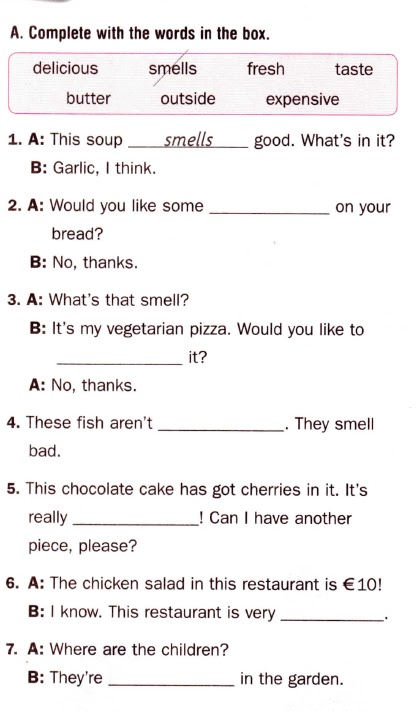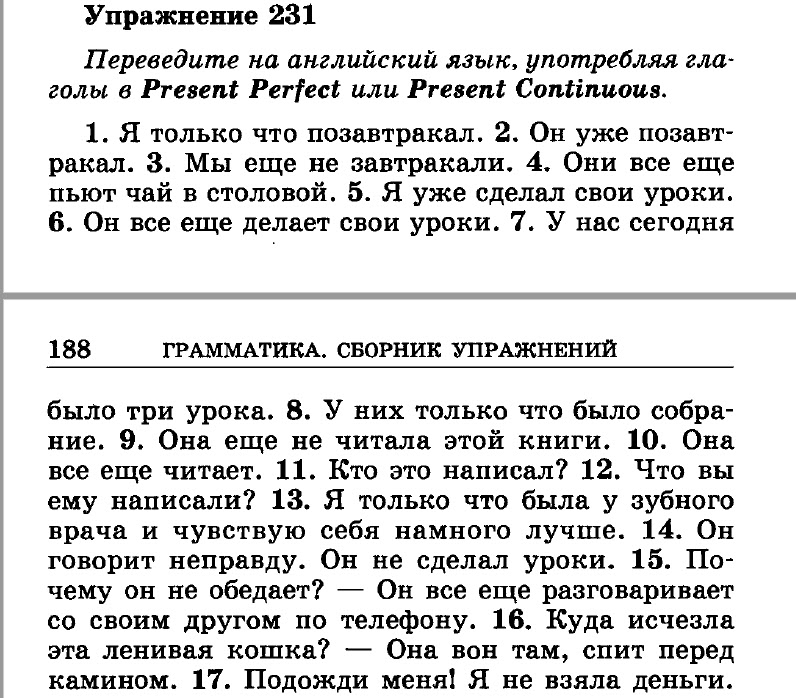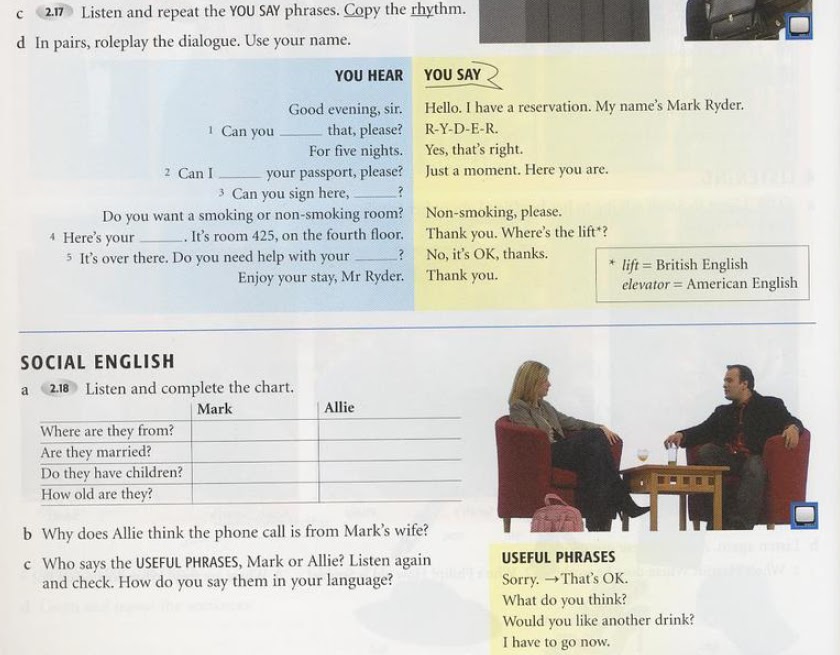понедельник, 31 октября 2016 г.
пятница, 21 октября 2016 г.
понедельник, 17 октября 2016 г.
Present Perfect - настоящее совершенное время. Food
Present Perfect - настоящее совершенное время
Время Present Perfect обозначает действие, которое завершилось к настоящему моменту или завершено в период настоящего времени. Хотя английские глаголы в Present Perfect обычно переводятся на русский язык в прошедшем времени, следует помнить, что в английском языке эти действия воспринимаются в настоящем времени, так как привязаны к настоящему результатом этого действия.
I have done my homework already.
Я уже сделал домашнее задание.
We have no classes today, our teacher has fallen ill.
У нас сегодня не будет уроков, наш учитель заболел.
Я уже сделал домашнее задание.
We have no classes today, our teacher has fallen ill.
У нас сегодня не будет уроков, наш учитель заболел.
Образование Present Perfect
Утвердительные предложения:
| I have played | We have played |
| You have played | You have played |
| He / she / it has played | They have played |
Вопросительные предложения:
| Have I played? | Have we played? |
| Have you played? | Have you played? |
| Has he / she / it played? | Have they played? |
Отрицательные предложения:
| I have not played | We have not played |
| You have not played | You have not played |
| He / she / it has not played | They have not played |
Время Present Perfect образуется при помощи вспомогательного глагола to have в настоящем времени и причастия прошедшего времени значимого глагола, то есть его «третьей формы».
To have в настоящем времени имеет две формы:
- has – 3 лицо, ед. ч. (He has played)
- have – 1 и 2 лицо ед.ч. и все формы мн. ч. (I have played)
Примечание:
Личные местоимения и вспомогательный глагол часто сокращаются до he’s, they’ve и т. п.
В зависимости от использованного в предложении времени сокращения типа he’s могут расшифровываться и как he is, и как he has.
В зависимости от использованного в предложении времени сокращения типа he’s могут расшифровываться и как he is, и как he has.
Причастие второе, или причастие прошедшего времени (Participle II), можно получить, прибавив к начальной форме значимого глагола окончание -ed:
examine – examined, enjoy – enjoyed, close – closed
Однако есть также достаточно большая группа неправильных английских глаголов, которые образуют форму прошедшего времени не по общим правилам. Для них форму причастия прошедшего времени нужно запомнить.
В вопросительном предложении вспомогательный глагол выносится на место перед подлежащим, а значимый глагол остается после него:
Have you seen this film?
Ты смотрел этот фильм?
Has she come yet?
Она еще не пришла?
Ты смотрел этот фильм?
Has she come yet?
Она еще не пришла?
В отрицательных предложениях за вспомогательным глаголом следует отрицательная частица not. Формы have и has при этом могут быть сокращены до haven’t и hasn’t соответственно:
I haven’t seen him since then.
С тех пор я его так и не видел.
С тех пор я его так и не видел.
Случаи употребления Present Perfect:
- Если говорящему важен сам факт произошедшего действия, а не его время или обстоятельства:
I have visited the Louvre 3 times.
Я посетил Лувр три раза.
Я посетил Лувр три раза.
Если время события имеет значение, то нужно использовать время Past Simple:
I visited the Louvre last year.
Я посетил Лувр в прошлом году.
Я посетил Лувр в прошлом году.
- Если период, в который произошло действие, еще не закончился:
I have finished reading “Dracula” this week.
На этой неделе я закончил читать «Дракулу».
На этой неделе я закончил читать «Дракулу».
В противном случае используется время Past Simple:
I finished reading “Dracula” 2 weeks ago.
Я закончил читать «Дракулу» две недели назад.
Я закончил читать «Дракулу» две недели назад.
- Для обозначения действий, которые начались в прошлом и продолжаются в момент разговора:
I’ve studied Spanish since childhood.
Я учил испанский с детства.
I haven’t seen my hometown for 45 years.
Я не видел свой родной город 45 лет.
Я учил испанский с детства.
I haven’t seen my hometown for 45 years.
Я не видел свой родной город 45 лет.
Hometask
пятница, 14 октября 2016 г.
понедельник, 10 октября 2016 г.
Вопросы. Закрепление. Порядковые числительные.
1. Составить все типы вопросов!
Упражнения на числительные в английском языке
А. Следующие предложения необходимо перевести на английский.
- 1. Мы читаем урок шестой, упражнение пятое.
- 2. Джон пишет сегодня четвертое письмо.
- 3. Сегодня одиннадцатое декабря.
- 4. Вчера было девятое января 2013 года.
- 5. Джек должен выучить сорок семь слов.
- 6. Сегодня шестьсот двадцать третий день с начала шоу.
- 7. Джейн родилась в 1980 году.
- 8. Это была вторая попытка Джеймса сдать этот экзамен.
Б. Назовите по-английски указанные ниже года:
1. 1943.
2. 2085.
3. 1950.
4. 1812.
2. 2085.
3. 1950.
4. 1812.
5. 1689.
6. 1238.
7. 1909.
8. 1700.
9. 2000.
10. 3004.
6. 1238.
7. 1909.
8. 1700.
9. 2000.
10. 3004.
Сделайте перевод предложений на русский:
- 1. It was Jane`s second impression.
- 2. Jack saw thousands of blubbers.
- 3. Sixty citizens voted for him.
- 4. Jack earned six hundred dollars a month.
- 5. That happened three hundred years ago.
- 6. This company employed fifty-nine workers.
Hometask
1. Переведите нижеследующие предложения на английский:
1. Джейн выполнила восьмое упражнение.
2. Любимое число Роберта – семнадцать.
3. Мама Джейн купила двадцать восемь апельсинов.
4. У моей кузины только одна квартира.
5. Существуют три пути его дому.
6. Первое и третье тестовое задание были легкими.
7. Их первый выбор был лучшим.
8. Барбаре необходимо шесть ингредиентов для ее торта.
2. Любимое число Роберта – семнадцать.
3. Мама Джейн купила двадцать восемь апельсинов.
4. У моей кузины только одна квартира.
5. Существуют три пути его дому.
6. Первое и третье тестовое задание были легкими.
7. Их первый выбор был лучшим.
8. Барбаре необходимо шесть ингредиентов для ее торта.
Переведи порядковые числительные на английский язык
| третий шестой девятый первый | семнадцатый второй пятидесятый пятый |
Переведи предложения на английский язык
1. Понедельник - первый день недели;
2. Среда - третий день недели;
3. Николай второй - последний Российский император;
4. Двадцатый век начинается с Первой Мировой Войны;
5. Знаменитый боксёр выигрывает в пятом раунде;
6. Я живу на втором этаже;
7. Энтони их четвёртый сын;
8. О чём девятая глава?
9. Она пытается перевести восьмое слово;
10. Я не понимаю, почему мой папа не хочет отмечать свой сороковой день рождения.
2. Среда - третий день недели;
3. Николай второй - последний Российский император;
4. Двадцатый век начинается с Первой Мировой Войны;
5. Знаменитый боксёр выигрывает в пятом раунде;
6. Я живу на втором этаже;
7. Энтони их четвёртый сын;
8. О чём девятая глава?
9. Она пытается перевести восьмое слово;
10. Я не понимаю, почему мой папа не хочет отмечать свой сороковой день рождения.
пятница, 7 октября 2016 г.
General questions exercises. Упражнения на общие вопросы.
Упражнение 1. Ask general questions and give short answers to them. Pay attention to the tense form of the verb in the questions.
- Jane eats lunch at the canteen every day. (at school?)
- I didn't sleep well last night. (last week?)
- I am studying my grammar book now. (learning the rules?)
- The children weren't watching TV last night. (doing their homework?)
- It wasn't cold yesterday. (the day before yesterday?)
- He won't be at home tonight. (tomorrow?)
- She can't play the piano. (the guitar?)
- They have visited many places. (the picture gallery?)
- He was given more time for the test. (you?)
- English is spoken in Australia. (Canada?)
Упражнение 2. Задайте общий вопрос и дайте краткий ответ
- Ted's advice wasn't clever.
- They had to go to school on Saturday.
- He won't be able to speak Italian in two months.
- They are not going to meet him.
- She mustn't take these pills.
- She won't have to write the exercise again.
- He couldn't swim last summer.
- She has to wear a uniform.
- She will be able to make sandwiches tomorrow.
Упражнение 3. Give short answers to these general questions.
- Did you go to the country last summer?
- Did you go for a picnic last Sunday?
- Can you see the sun now?
- Can you see the stars now?
- Does your pet sleep at night?
- Do you like watching the clouds?
Упражнение 4. Измените предложения так. Чтобы они стали вопросительными. Make general questions.
- The rabbit is hopping now.
- Children are swimming now.
- I am reading a book now.
- Dave is riding his bike now.
- We are planting some seeds now.
- She is giving me a rubber now.
Special questions exercises
Упражнение 1. Составьте специальные вопросы из предложенных слов.
- are / this / at / Why / like / looking / you / me?
- do / to / university / What / enter / you / want?
- Nick / his / How / does / after / disease / feel?
- How / were / people / there / the / many / street / in?
- are / holidays / Where / for / you / going / your?
Упражнение 2. Ask special questions to the sentences beginning with the words given in brackets.
Example: I saw him yesterday. (where?)Where did you see him?
- Some children do stupid things. (why?)
- I am looking for my watch (what?)
- His penfriend lives in London. (where?)
- We met after school yesterday. (when?)
- She'll come to the party. (with whom?)
- English is spoken in many countries. (what countries?)
- He was not prepared for the test. (why?)
- They were playing a game when I came. (what game?)
- I have made some mistakes in this exercise (how many?)
- He has given me his old camera. (what?)
Упражнение 3. Write questions to the sentences.
Example I'll change my hobby. (why)Why will you change your hobby?
- They didn't expect me when I came. (who, why)
- You can find out the timetable of trains at the railway station (where, what)
- They have practised the song for two days. (how long)
- I will never scold my own children. (why)
- Ted was lucky to join the basketball team. (who)
Упражнение 4. Write questions to the sentences.
Example He asked a silly question. (what)What question did he ask?
- He visited his aunt in summer. (when
- My father likes to travel by train. (how)
- She has never been at a big railway station. (why)
- We buy railway tickets at the booking-office. (where)
- Some children go to school by bus. (by what)
Упражнение 5. Write questions to which the following sentences are answers.
- A lesson lasts forty minutes.
- We had only five lessons.
- I am reading a rule now.
- We haven't examinations this year.
- The holiday will start next month.
- I was looking out of the window at that moment.
- There are no problem children in my class.
- All tests are prepared by the teachers.
- My mother came to school.
- I was given another text.
Упражнение 6. Write questions to the underlined words.
- The sportsman has achieved good results.
- Something has bitten me.
- I can hardly do it in time.
- There was a funny expression on her face.
- We shall divide the cake between us.
- The weather was nasty.
- The rest of them stayed at home.
- He can suggest a better plan.
Tag questions exercises.
Упражнение 2. Допишите хвостик разделительного вопроса.
- They won't go to the party, ___________?
- This house is new, ___________?
- I'm your doctor, ___________?
- There is much snow there, ___________?
- There is no juice in the fridge, ___________?
- She never comes in time, ___________?
- They have got a new house, ___________?
- They had many tomatoes last summer, ___________?
- They had to buy a new desk, ___________?
- They had no time to discuss the problem, ___________?
Упражнение 3. You are talking to a friend. Ask him/her to agree with these statements. Use question tags.
Example:Smoking is bad for you.Smoking is bad or you, isn't it?
- Money isn't everything.
- Computers are very useful.
- Some people watch too much TV
- People didn't have TV 100 years ago.
- Life was better 100 years ago.
- We can all make mistakes.
- Parents shouldn't hit their children.
6 класс.
Упражнение 4. Add tags to make disjunctive questions.
ExampleYou went to see the doctor, didn't you?
- You were playing showballs after the lessons, ___________?
- You play snowballs every winter, ___________?
- They were doing their homework yesterday after supper, ___________?
- You did your homework after school, ___________?
- They entered the classroom after the teacher, ___________?
- She was writing a letter when you phoned, ___________?
- Bob was playing the piano when we came, ___________?
Упражнение 5. Допишите хвостик разделительного вопроса.
- The boy wasn't taken home, ___________?
- Our homework was not checked by the teacher, ___________?
- The new rules were explained to you, ___________?
- The words were not written on the blackboard, ___________?
- The English Channel was crossed by many swimmers, ___________?
- The street was named after M. Bagdanovich, ___________?
- You were born in 1982, ___________?
- This coffee wasn't grown in India, ___________?
- All the children were given presents, ___________?
- All the mistakes were noticed by the teacher, ___________?
Упражнение 6. Допишите хвостик разделительного вопроса
- There was something you wanted, ___________?
- There was nobody in the room, ___________?
- He has never been to Asia, ___________?
- You have had the computer for two years, ___________?
- They had a good time there, ___________?
- I am a great singer, ___________?
- They went to Alaska ten years ago, ___________?
- They want to go to Siberia, ___________?
- This is the Mississippi River, ___________?
- These are your photos, ___________?
Упражнение 7. Change the statements into disjunctive questions
Example: He likes to read funny stories.He likes to read funny stories, doesn't he?He is not always patient.He is not always patient, is he?
- You study English.
- They are discussing a new topic now.
- He went for a walk in the valley an hour ago.
- I was learning a poem when he came.
- Maize is not grown in this part of the country.
- You were not sure in his success.
- They have studied at this school for 7 years.
- We shan't write a dictation tomorrow
- We are given homework every day.
- This rule was explained to us yesterday.
Упражнение 8. You are interviewing Molly. Complete the conversation.
You: Molly. You've always wanted to be an actress, haven't you?
Molly: Yes. I have.
You: You started acting when you were a small child, ___________?
(Molly: Yes. I appeared on stage for the first time when I was only four.
You: You're Canadian, ___________?
Molly: Yes, I am.
You: You were born in Toronto, ___________?
Molly: That's right.
You: But you didn't go to acting school in Canada, _____________?
Molly: No, I studied acting in New York.
You: You were there for two years, _____________?
Molly: That's right.
You: You live in London now, ______________?
Molly: Yes, I do.
You: And you're married, _________________?
Molly: Yes, I am.
You: Your husband isn't Canadian, ____________________?
Molly: No, he isn't. He's English.
You: And you've got two children, ___________________?
Molly: Yes, we have. A boy and a girl.
Hometask
Подписаться на:
Комментарии (Atom)















































